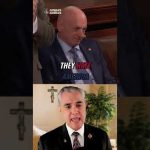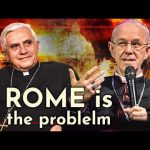Hussam Abu Sini and Chiara Pezzulich bring their daughter, Marta, to be baptized on Thursday, Oct. 19, 2023, in St. John the Baptist Catholic Church in Haifa, Israel. / Credit: Photo courtesy of Hussam Abu Sini
Jerusalem, Oct 25, 2023 / 07:00 am (CNA).
Catholic couple Hussam Abu Sini and Chiara Pezzulich hadn’t planned to baptize their baby girl so soon, but the war between Israel and Hamas has changed everything.
The family lives in Haifa, 40 kilometers (about 25 miles) from Lebanon. Hussam, an Arab-Israeli, was born in Nazareth and studied medicine in Italy, where he met his wife. They have two young children. On Thursday, Oct. 19, they baptized their second daughter, Marta, who is 4 months old.
“We are Catholics, and from the beginning, we knew we wanted to baptize our daughter, but the war hastened everything,” Abu Sini told CNA. “We baptized our first child, Giovanni, during the pandemic. This time, we hoped to be all together.”
But on the day the missile alert sounded in Haifa, Hussam and Chiara decided to baptize Marta as soon as possible. “With Giovanni, we had already understood that the important thing was not so much the party — certainly, the party is beautiful — but the sacrament.”
Hussam Abu Sini holds his daughter, Marta, at her baptism Oct. 17, 2023, at St. John the Baptist Church in Haifa, the church of the Hebrew-speaking Catholic community in Israel. Credit: Photo courtesy of Hussam Abu Sini
On the morning of Oct. 7, the day Hamas terrorists struck Israel, Hussam and Chiara were near Abu Gosh with family and friends — both Palestinians and Israelis — for a few days of vacation. Since then, they have recited the Angelus prayer daily with the same friends and others who join them online from Italy. This daily five minutes helps to reaffirm what is the source of their hope and peace.
“The only hope is in the Church. That’s why we wanted our daughter to be part of [the Church] as soon as possible,” Abu Sini told CNA. “In the Church, we have learned — and we believe — that we can stand on the cross, but life does not end with death: Christ has conquered death! In him, we place our certainty, and we entrust our daughter to him.”
Hussam Abu Sini and Chiara Pezzulich and their children. Credit: Photo courtesy of Hussam Abu Sini
The baptism was held at St. John the Baptist Church, the parish of the Hebrew-speaking Catholic community in Haifa. The Mass was in Hebrew, Arabic, and Italian. “Only in the Church can something like this happen: hearing these languages in the same celebration, together, far from all the contradictions that exist just outside the door,” Abu Sini said.
The couple’s decision to baptize Marta helped to clarify their plans. “We decided that if the situation worsens, my wife will go to Italy with the children, but I will stay here. I am a doctor; I cannot leave. But I also do not want to; I want to help out here.”
Marta, the 4-month-old daughter of Hussam Abu Sini and Chiara Pezzulich, was baptized Thursday, Oct. 19, 2023, at St. John the Baptist Church in Haifa, Israel. Credit: Photo courtesy of Hussam Abu Sini
Abu Sini specializes in oncology and was scheduled to take his medical licensing exam at the end of October. When the war broke out, he was on study leave from work for a few days. “On Oct. 8, we were notified that the exam was postponed indefinitely, and we were called back to [military] duty,“ he said.
Many of Abu Sini’s Jewish colleagues were called to serve in field hospitals. Arab doctors — almost all of whom are Arab-Israeli citizens and do not perform military service — were all recalled to duty in health care facilities.
In Israel, according to the latest data from the Ministry of Health, 46% of health care personnel are Arab — more than double the percentage of Arabs in the total population. Hospitals and health care centers are places where the coexistence of the two main groups of Israeli society is most pronounced. This is even more true in “mixed cities“ like Haifa, where Arabs and Jews are in close contact every day.
“Since the war began, some of my colleagues look at me with suspicion, and sometimes I hear comments that hurt me as a person,” Abu Sini said. “But these are isolated cases — often they are people who have lost a family member or acquaintance and are overwhelmed by anger.”
Abu Sini has patients from Gaza and the West Bank whom he hasn’t seen since the war began because all agreements have been suspended. These agreements between Israel and the Palestinian Authority allow patients to cross into Israel to receive health care, but this has now been suspended due to the state of war.
Hussam Abu Sini is a Catholic medical doctor who lives in Haifa with his life Chiara and their two young children. He said if the war continues to worsen he will stay to help. October 2023. Credit: Photo courtesy of Hussam Abu Sini
Abu Sini describes his recent return to work: “At first, it wasn’t easy. I had already planned to focus solely on studying, without interference … Then my patients made me realize how important it was that their doctor was there for them. As an oncologist, this is how I bring peace,” he told CNA.
“In my field, in addition to medical therapy, psychological therapy is also very important. I chose to become an oncologist also for this reason. With the war, I see that cancer patients lose confidence — ‘I will die anyway, why should I fight?’ Being there for them and helping them understand that their life matters makes a difference. I almost got angry with myself because in the first few days, I only thought of myself without considering my duty. Since then, I have realized that my presence is important here, for them and for me.”
Abu Sini was 11 years old during the second Intifada (a major Palestinian uprising in the Palestinian territories and Israel), and in 2006 he witnessed the second war between Israel and Lebanon. A rocket fell in Nazareth, the neighborhood where he lived at the time.
“The fear we have now is not even comparable to that… It’s something new, never seen before. And it’s also new because now I am a father, while before I wasn’t… Even my self-awareness has changed.”
Abu Sini said that every day when he says goodbye to his wife and children and leaves home, “I cannot help but think about what could happen while I am not with them. I rely on the presence of Christ among us. All the drama of living remains, the fear, the beating heart, but with Christ, life itself is more meaningful — even when things are not going well.”















